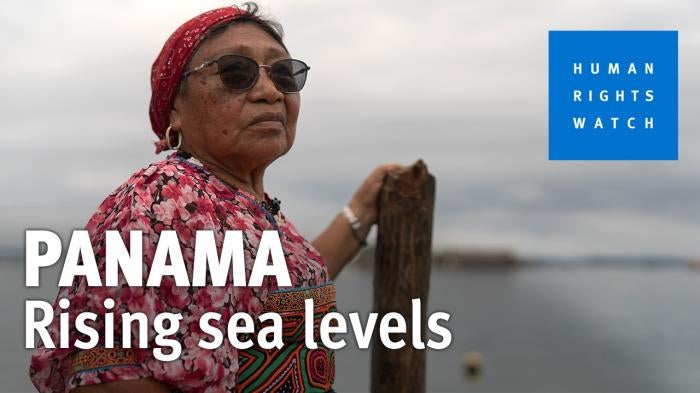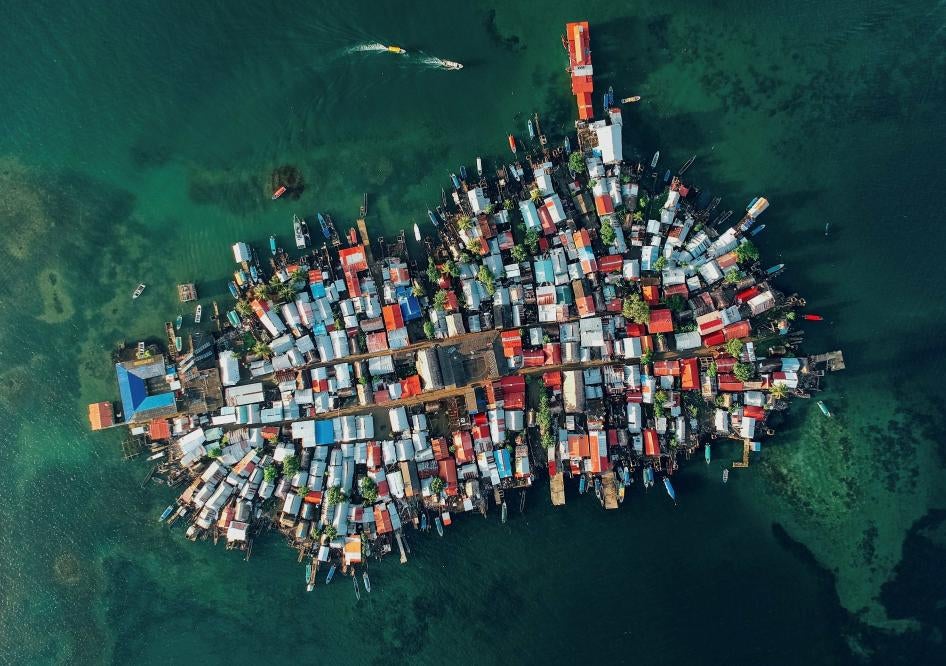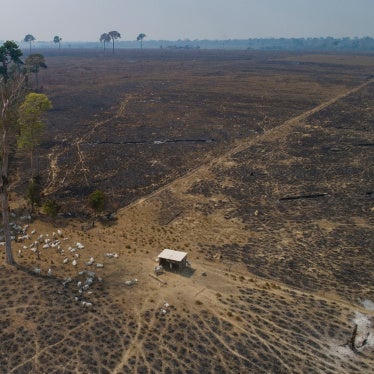- Sea level rise and lack of space threaten the rights of people living on the tiny island of Gardi Sugdub and other coastal Indigenous communities in Panama.
- The community of Gardi Sugdub has planned for their relocation to a safer mainland site for over a decade, but long-promised support from the government has been delayed.
- Panama should provide immediate support so the Gardi Sugdub community can complete their relocation with dignity and should build on lessons learned to develop a national policy to safeguard human rights in future climate-related relocations.
(Panama City) – Sea level rise and lack of living space threaten the rights of Guna Indigenous people living on Panama’s small island of Gardi Sugdub, Human Rights Watch said in a report released today. The community began planning to relocate to the mainland in 2010, but no one has yet been able to move.
The 52-page report, “‘The Sea is Eating the Land Below Our Homes’: Indigenous Community Facing Lack of Space and Rising Seas Plans Relocation,” documents both why the Gardi Sugdub community decided to relocate and how government delays and incomplete support for relocation have stalled the move and left the community in limbo. Human Rights Watch found that while some aspects of Panamanian government and Inter-American Development Bank support for the community have been exemplary, urgent action is needed to ensure that community members’ rights are respected in the relocation.
“Panama should follow through on its promises and provide immediate support so the Gardi Sugdub community can relocate with dignity,” said Erica Bower, climate displacement researcher at Human Rights Watch and author of the report. “It’s not too late for the government to take this opportunity and create a blueprint that coastal communities elsewhere in Panama and globally can turn to as they confront the climate change crisis.”
The report is based on over 40 interviews with Gardi Sugdub community members and others involved in the relocation process.
Gardi Sugdub is a tiny, flat, and crowded island of nearly 1,300 people just off Panama’s northern coastline. A part of the Guna Yala autonomous region, the island has been home to Guna Indigenous people for over a century. Originally Gardi Sugdub offered refuge from mainland mosquito-borne illnesses and colonial restrictions, but today, the island faces new challenges. There is no room to expand, and floods are already making life harder for the island’s residents, affecting their rights to adequate housing, health, education, and culture. Some rise in future sea levels is inevitable, according to the latest report of the Intergovernmental Panel on Climate Change, threatening long term island habitability and prompting this community to choose relocation to the mainland as a measure of last resort.
President Laurentino Cortizo promised, after earlier dates for the relocation came and went, that the new site will be ready on September 25, 2023, according to community members. The Housing Ministry recently delayed the date yet again, to February 2024. The new date is the latest in a series of unfulfilled promises that include a partly constructed, now abandoned hospital and glacial progress on building a school. The authorities have not provided a full explanation for the delays to all community members, who have requested greater transparency on timelines and budgetary changes and increasingly fear the new timeline will not be met.
A community leader involved in the process said, “The government is not complying with what it agreed to for this project. Look at that delay. That is not fair.” He is not alone. An elder said: “I might not even see this relocation happen in my lifetime. All other leaders who started the project have died in this process.”
Human Rights Watch found that, without prompt government action, conditions at the new site may threaten people’s rights to an adequate standard of living, housing, water, health, education, and culture. Plans for water, sewage, and trash management at the relocation site and at the nearby model school are inadequate. The new site experiences erosion during floods and lacks shade to protect people from hot temperatures. As of April, the proposed site for a small health center had not yet been prepared for construction.
At the same time, not everyone wants to relocate. Some Gardi Sugdub community members wish to remain on the island, and they need continued access to basic services, including health care, education, and electricity. Others intend to regularly commute back and forth between the island and mainland for livelihood and cultural reasons and require improved access to transportation to make that possible.
Gardi Sugdub is not alone: 38 communities in Panama may require relocation because of a combination of overcrowding and sea level rise. Over 400 communities globally have completed or are undertaking relocation because of natural hazards, including those that are expected to increase in frequency and intensity because of climate change. Gardi Sugdub’s experiences offer important lessons about the process of community-led relocation for subsequent efforts, Human Rights Watch said.
Planned relocation is an adaptation measure of last resort with serious risks, making it essential that planning respects human rights principles such as meaningful participation, informed consent, and nondiscrimination. Most critically, communities like Gardi Sugdub need to be leading the way at all stages of the relocation process.
Some governments, such as the Pacific Island nations of Fiji and the Solomon Islands, have developed policies for planned relocation, although no country in the Americas has yet done so. Panama should learn from its experience in Gardi Sugdub and design the first national policy to safeguard peoples’ rights during planned relocation in the Americas.
The international community should also build on lessons learned from the Inter-American Development Bank’s model of community-engaged support for Gardi Sugdub. The bank provided important support for the project from 2018 to 2023, although that support ends this month. As planned relocations are complex and require long term support, future support from development banks and other international organizations requires extended timelines and ongoing monitoring and evaluation.
The relocation of Gardi Sugdub is planned at a time when the Intergovernmental Panel on Climate Change (IPCC), the world’s leading authority on climate science, finds that “as climate risk intensifies, the need for planned relocations will increase.” This reality makes it essential to learn from past experiences of community-led relocation like Gardi Sugdub.
“Governments the world over should plan in an anticipatory, inclusive, and rights-respecting way today to avert foreseeable rights violations in the future,” Bower said.









